To ensure energy security and achieve its climate protection goals, Germany will import large quantities of hydrogen in the future. Dimethyl ether (DME) is an environmentally friendly, non-toxic, efficient, and economically attrac-tive gas that shows great promise as an energy source for hydrogen and its derivatives. The Fraunhofer Institute for Solar Energy Systems ISE has developed a new, particularly energy-efficient synthesis process for its production, which could become a game changer for DME production and thus for the hydrogen economy. In the international “Power-to-MEDME” project, the entire process chain for large-scale production of methanol and DME in Chile was researched on this basis.
more infoPress Releases
-
Press Release #2 / 2026
Fraunhofer ISE: Dimethyl Ether Could Be the Game Changer for the Hydrogen Economy

-
Press Release #1 / 2026
German Public Electricity Generation in 2025: Wind and Solar Power Take the Lead For the First Time

In 2025, the share of renewables in Germany’s net public electricity generation amounted to 55.9 percent, as in the previous year. Wind power took first place as the strongest net electricity producer, followed by photovoltaics, which increased its production by 21 percent in 2025 and overtook lignite for the first time. The share of electricity generation from fossil fuels stagnated in 2025, with the decline in lignite-based electricity generation being offset by rising natural gas consumption. The share of imports in the electricity mix fell in 2025 compared to the previous year. This analysis is based on the energy-charts.info data platform of the Fraunhofer Institute for Solar Energy Systems ISE, which provides interactive graphs on electricity generation for the whole of Europe.
more info -
Press Release #32 / 2025
Self-Consumption of Solar Power is Rising Sharply in Germany

Until 2009, German PV system owners hardly used any of the electricity they generated themselves, as the feed-in tariff for photovoltaic electricity was higher than the price of electricity purchased from the grid. Since this ratio has reversed and sector coupling has expanded the possibilities for use, the economically motivated self-consumption of solar power in Germany has risen sharply. Research scientists at the Fraunhofer Institute for Solar Energy Systems ISE have now developed the first method for quantifying PV self-consumption based on data from the market master data register and transmission system operators. They published their findings in an analysis for the German Federal Environment Agency.
more info -
Press Release #31 / 2025
Fraunhofer ISE Spin-Off Heat Pumps Watch Provides Neutral Facts About Heat Pumps
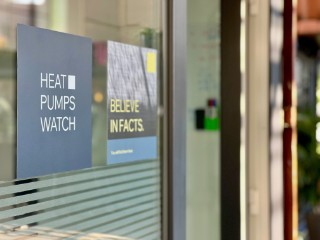
The goal of "Heat Pumps Watch" is to collect, evaluate, and present scientific findings on heat pumps making them easy to understand and useful for different target groups. The spin-off led by scientist Dr. Marek Miara from the Fraunhofer Institute for Solar Energy Systems ISE in Freiburg aims to provide orientation on the topic of heat pumps for professionals, policymakers, and homeowners considering a change in their heating systems. Heat Pumps Watch is a non-profit organization, and its first project is funded by the Climate Neutrality Foundation.
more info -
Press Release #30 / 2025
Fraunhofer ISE Research Project Completed: Heat Pumps Provide Climate-Friendly Heating in Existing Buildings
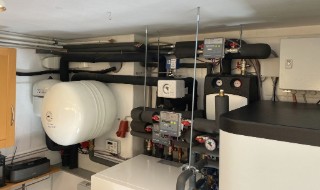
Heat pumps provide efficient and climate-friendly heating also in existing buildings. This is the conclusion of a research project by the Fraunhofer Institute for Solar Energy Systems ISE. Over four years, researchers conducted detailed measurements on 77 heat pumps in single-family to three-family homes. The result: the heat pumps achieved seasonal performance factors ranging from 2.6 to 5.4. The CO2 emissions of the heat pumps, calculated for the first time considering time-variable factors, were 64 percent lower in 2024 compared to those of natural gas heating systems. The research team also conducted long-term sound measurements and investigated how photovoltaic systems can be integrated into heat pump operation. In addition to Fraunhofer ISE, two energy suppliers and nine heat pump manufacturers participated in the project.
more info -
Press Release #29 / 2025
Energy transition in the railway power grid: direct feed-in of solar power through innovative inverters
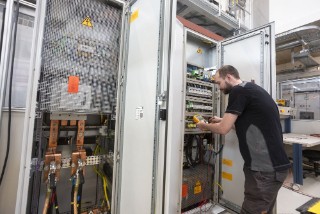
Deutsche Bahn is the largest electricity consumer in Germany, operating its own power grid of nearly 8,000 kilometers in length. The project "PV4Rail" examined how this grid can be utilized for the feed-in of solar power. The consortium lead by Fraunhofer ISE developed and tested an inverter for the direct feed-in of photovoltaic power, analyzed the photovoltaic potential along the tracks, and conducted techno-economic studies of railway power PV systems. These could become an important component of the energy transition if regulatory and market disadvantages were addressed.
more info -
Press Release #28 / 2025
Hans-Martin Henning: Driving Force Behind Fraunhofer Energy Research Retires
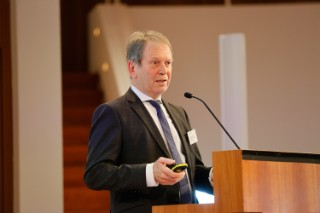
Prof. Hans-Martin Henning was honored yesterday with a scientific symposium to mark his retirement. The director of the Fraunhofer Institute for Solar Energy Systems ISE in Freiburg also shaped the Fraunhofer Society's energy research for many years. As chairman of the Expert Council for Climate Issues, he advised the German government on the implementation of the Climate Protection Act from 2020 to 2025 and, in this role, was a vocal advocate for consistent measures.
more info -
Press Release #27 / 2025
Innovative Production Processes for the Core Components of Fuel cells and Electrolyzers

The transition of the heavy-duty and commercial vehicle sector to zero-emission engines is driving the expected production volume of fuel cells. At the same time, electrolysis is gaining importance as a building block for a low-emission energy economy. New production methods are needed to ramp up the market for both technologies. In this context, Fraunhofer ISE has established a versatile platform for research on the production of membrane electrode assemblies to support component manufacturers as well as machinery and plant engineers in addressing production challenges associated with fuel cells and electrolyzers. The focus is on innovative, continuous processes that enable high throughput rates and cost reductions, such as roll-to-roll manufacturing. Furthermore, pro-duction research considers the entire value chain from catalyst powder to 7-layer MEA, including quality control.
more info -
Press Release #26 / 2025
International Research Team Unlocks the Power of Passivation for Perovskite Silicon Tandem Solar Cells
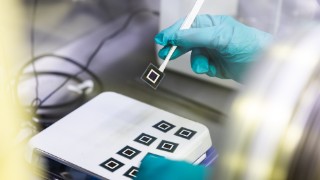
An international research team of photovoltaics scientists has taken a crucial step toward the industrialization of perovskite silicon tandem solar cells. They demonstrated that passivation of the perovskite top cell is possible in combination with textured silicon bottom cells featuring large pyramid size, which are the current industry standard for solar cells. Additionally, they discovered that the passivation affects the entire perovskite layer – unlike silicon, where surface treatment only influences the upper layers – leading to further efficiency improvements. The PV researchers from King Abdullah University of Science and Technology (KAUST), University of Freiburg and Fraunhofer Institute for Solar Energy Systems ISE presented their technological and scientific innovations for the passivation of perovskite top cells in the journal Science.
more info -
Press Release #25 / 2025
Fraunhofer ISE develops test procedure for grid-forming inverters

In addition to expanding renewable energy generation, a successful energy transition requires stable system operation at all times. To achieve this, renewable energies and storage power plants will have to take on extensive system services and essential grid-forming properties in the future. In the “GFM Benchmark” project, Fraunhofer ISE developed a test procedure for grid-forming inverters on behalf of the four German transmission system operators and applied it to devices from various manufacturers. On the one hand, the project provided a comprehensive overview of the market readiness of grid-forming inverters. On the other hand, the project results provide an important practical check for new national and European testing standards.
more info